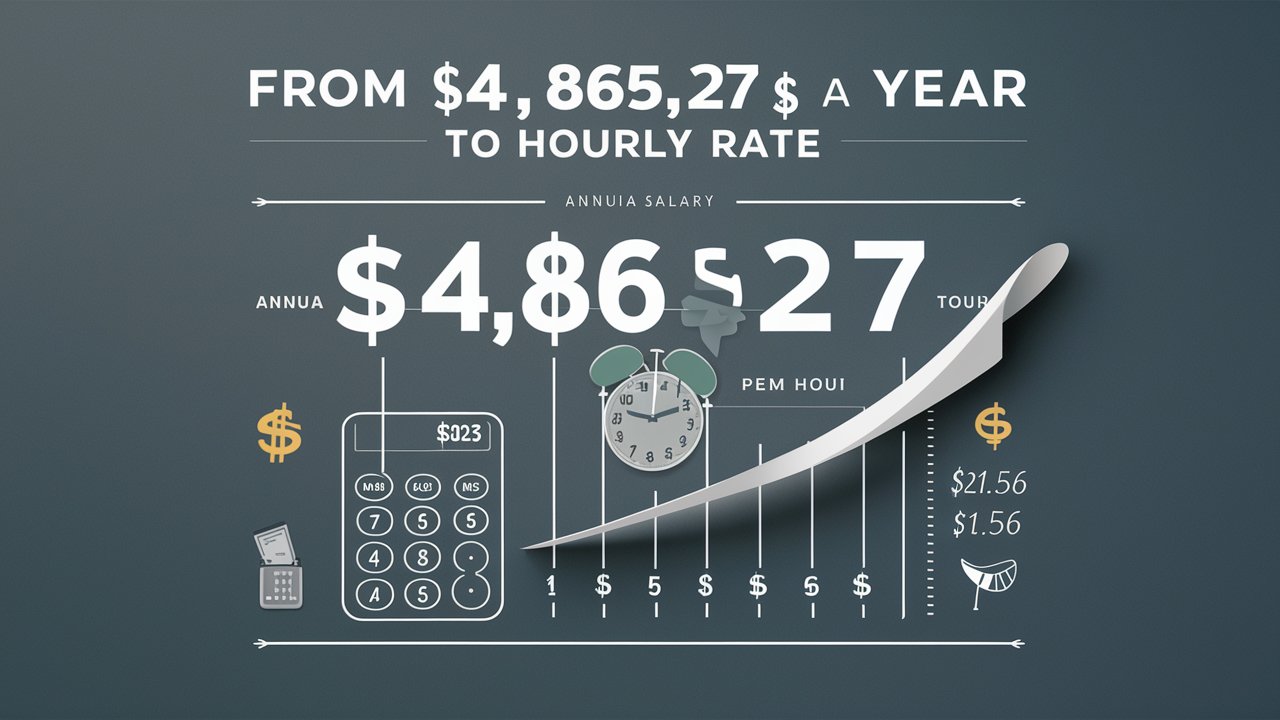Converting 44,865.27 a year to hourly wage helped me realize the true value of my time, showing that I earn about $22.43 per hour. This insight empowered me to better manage my finances and evaluate job opportunities more effectively.
44 865.27 A Year To Hourly translates to approximately $22.43 per hour, assuming a standard 40-hour workweek and 2,080 working hours per year.This calculation helps you understand your earnings on an hourly basis, aiding in better financial planning.
We will discuss how to convert an annual salary of 44,865.2Calculate Your True Earnings 7 into hourly wage. This conversion is crucial for budgeting, assessing job offers, and better managing your finances.
How To Convert 44,865.27 A Year To Hourly Wage
When discussing salaries, many people think in annual terms. However, understanding your income on an hourly basis can provide better insights into how much you truly earn for your time.
If you’re making $44,865.27 a year and want to break it down to an hourly rate, this guide will take you through the process step by step.
Why Convert An Annual Salary To An Hourly Wage?
Knowing Your Hourly Wage Is Crucial For Several Reasons:
- Budgeting: Helps in planning daily, weekly, and monthly expenses.
- Comparison: Enables you to compare job offers that list hourly wages against your current salary.
- Time Management: Gives you a better understanding of the value of your time, which can influence decisions on overtime work or side gigs.
Step 1 – Determine Your Work Hours Per Year!
To calculate your hourly wage, you first need to know how many hours you work in a year. The standard full-time work schedule in the U.S. is 40 hours per week, with 52 weeks in a year. However, not everyone works a full 52 weeks due to holidays, vacations, and sick leave.
Calculation Example:
- Full-Time Work Hours: 40 hours / week * 52 weeks = 2,080 hours / year
- Adjusting for Time Off: If you take 2 weeks off for vacation, your working weeks reduce to 50.
- 40 hours/week * 50 weeks = 2,000 hours/year
For this example, we’ll use 2,000 hours per year as a working estimate.
Step 2 – Divide Your Annual Salary By Your Work Hours!
Now that you know how many hours you work in a year, you can easily convert your salary to an hourly wage.
Calculation Example:
- Annual Salary: $44,865.27
- Work Hours: 2,000 hours/year
Hourly Wage = Annual Salary / Work Hours = 44,865.27 / 2,000 = 22.43 per hour
So, if you earn $44,865.27 a year and work 2,000 hours annually, your hourly wage is approximately $22.43.
Understanding The Impact Of Taxes And Deductions
Your gross hourly wage is $22.43, but that’s before taxes and other deductions. Depending on your state, federal tax bracket, and any additional deductions (like healthcare, retirement contributions, etc.), your net hourly wage could be significantly lower.
Step 3 – Adjust For Overtime And Irregular Work Hours!
If you work overtime or have irregular hours, your hourly wage calculation will be different. Overtime pay in the U.S. is typically 1.5 times your regular hourly wage, so if you’re frequently working overtime, you’ll need to adjust your calculations.
Calculation Example:
- Regular Hours: 1,920 hours/year (48 weeks of 40 hours each)
- Overtime: 80 hours/year (2 hours of overtime per week for 40 weeks)
Total Work Hours =1,920 + 80 = 2,000 hour
Overtime Pay =80 × (22.43×1.5) = 80 × 33.65 = 2,692
Add the overtime pay to your salary:
Total Salary with Overtime = 44,865.27 + 2,692 = 47,557.27
Hourly Wage with Overtime = 47,557.27 / 2,000 = 23.78
Step 4 – Factor In Additional Income Or Bonuses
If your job includes bonuses, commissions, or other financial incentives, include these in your annual income before dividing by your work hours.
Calculation Example:
- Base Salary: $44,865.27
- Annual Bonus: $5,000
Total Annual Income = 44,865.27 + 5,000=49,865.27
Hourly Wage with Bonus = 49,865.27/2,000 =24.93
Step 5 – Adjust For Part-Time Or Freelance Work!
If you’re a part-time or freelance worker, your hours will vary, making it essential to track your time accurately. The formula remains the same, but you need to calculate the actual hours worked.
What Are The Key Factors Influencing Hourly Wage Calculations?
- Geographic Location: Wages and the cost of living vary by region. In high-cost areas, salaries might seem higher, but the actual value could be lower after expenses.
- Industry and Role: Different industries pay differently for the same amount of work. For instance, tech roles often pay more than retail or service jobs.
- Experience and Education: More experience or a higher degree typically translates to a higher salary, which in turn increases your hourly wage.
How To Use This Information For Career Planning?
Understanding your hourly wage can guide career decisions. If you know your time is worth $22.43 an hour, you can assess whether taking on additional tasks, learning new skills, or pursuing a promotion is worth the effort.
It can also help you decide whether to negotiate for a higher salary or look for opportunities that pay better per hour.
Conclusion:
Converting your annual salary to an hourly wage provides a clear picture of how much your time is worth. This understanding is critical for budgeting, job comparisons, and personal financial planning. Remember to consider all factors, including taxes, bonuses, and overtime, to get the most accurate figure.
FAQs:
How Do I Calculate My Hourly Wage If I Work Part-Time?
Divide your annual income by the total number of hours worked in the year. For part-time work, this will be fewer than the standard 2,080 hours.
How Does Overtime Affect My Hourly Wage Calculation?
Overtime increases your total income, which, when divided by your total hours worked (including overtime hours), results in a higher hourly wage.
Is My Hourly Wage Before Or After Taxes?
The calculation we provided is before taxes. After taxes, your net hourly wage will be lower.
What If My Hours Vary Each Week?
Track your total hours over a year and divide your annual income by this number to get your average hourly wage.
Can Bonuses Be Included In My Hourly Wage Calculation?
Yes, include any bonuses or additional income in your annual salary before dividing by the total hours worked.
How Do I Adjust My Hourly Wage For Different Cost-Of-Living Areas?
You can use a cost-of-living calculator to adjust your hourly wage to reflect the differences in living expenses across regions.
What Should I Consider When Comparing Job Offers?
Besides the hourly wage, consider benefits, job security, location, and career growth opportunities.
Is It Better To Think Of My Salary Hourly Or Annually?
It depends on your financial goals. Hourly rates help with budgeting and valuing your time, while annual salaries give you a long-term income perspective.
Can I Negotiate My Salary Based On My Hourly Wage?
Yes, knowing your hourly wage can give you a solid basis for negotiation, especially if you can demonstrate your value per hour.
How Do I Calculate My Hourly Wage If I Have Multiple Income Sources?
Add all sources of income to get your total annual income, then divide by the total hours worked across all jobs.



